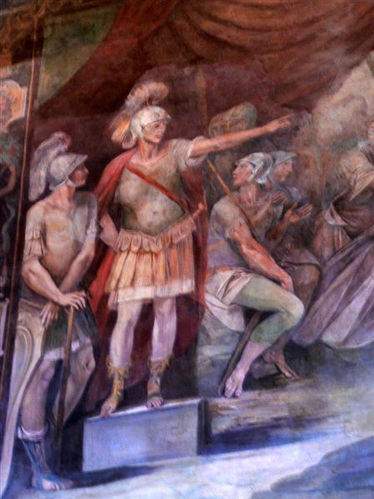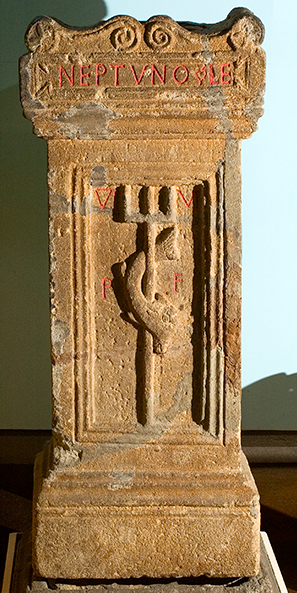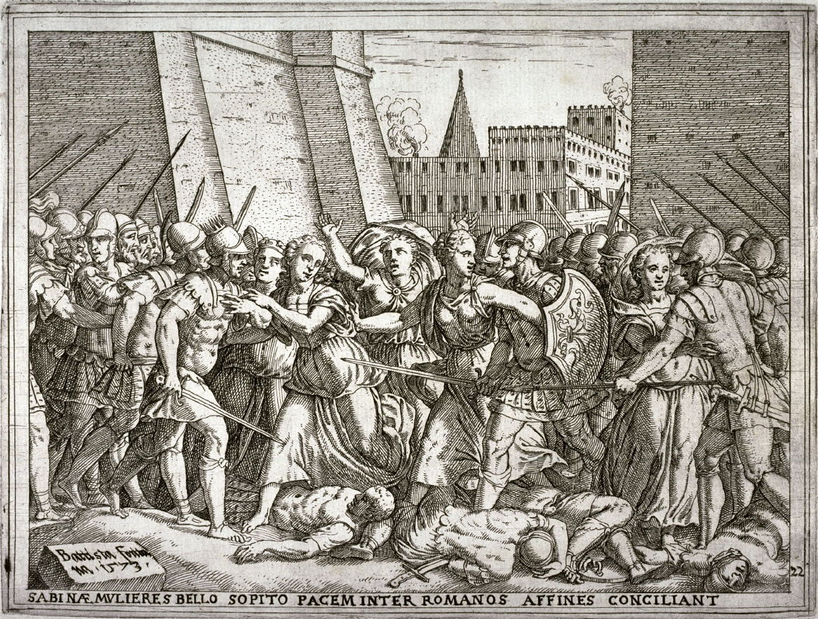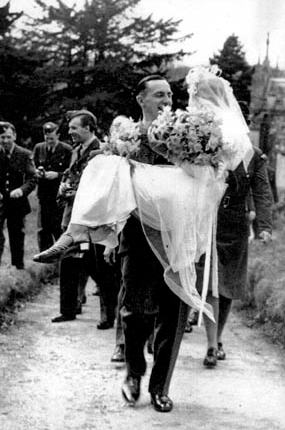Editor’s Note: This is the eleventh chapter of Romulus, by Jacob Abbott (published 1902).
XI. Wives
Every reader who has made even the smallest beginning in the study of ancient history, must be acquainted, in general, with the mode which Romulus adopted to provide the people of his city with wives, by the transaction which is commonly called in history the rape of the Sabines. The deed itself, as it actually occurred, may perhaps have been one of great rudeness, violence, and cruelty. If so, the historians who described it contrived to soften the character of it, and to divest it in a great measure of the repulsive features which might have been supposed to characterize such a transaction, for, according to the narrative which they give us, the whole proceeding was conducted in such a manner as to evince not only great ingenuity and sagacity on the part of Romulus and his government, but also great moderation and humanity. The circumstances, as the historians relate them, were these:
As might naturally be supposed from the manner in which the company which formed the population of Rome had been collected, it consisted at first almost wholly of men. The laws and regulations referred to in the last chapter, in respect to the family relation, were those framed after the organization of the community had become somewhat advanced, since at the outset there could be very few families, inasmuch as the company which first met together to build the city, consisted simply of an army of young men. It is true that among those who joined them at first there were some men of middle life and some families,—still, as is always the case with new cities and countries suddenly and rapidly settled, the population consisted almost entirely of men.
It was necessary that the men should have wives. There were several reasons for this. First, it was necessary for the comfort and happiness of the people themselves. A community of mere men is gloomy and desolate. Secondly, for the continuance and perpetuity of the state it was necessary that there should be wives and children, so that when one generation should have passed away there might be another to succeed it. And, thirdly, for the preservation of order and law. Men unmarried are, in the mass, proverbially ungovernable. Nothing is so effectual in keeping a citizen away from scenes of tumult and riot as a wife and children at home. The fearful violence of the riots and insurrections of which the city of Paris has so often been the scene, is explained, in a great degree, by the circumstance that so immense a proportion of the population are unmarried. They have no homes, and no defenseless wives and children to fear for, and so they fear nothing, but give themselves up, in times of public excitement, to the wildest impulses of passion. Romulus seems to have understood this, and his first care was to provide the way by which as many as possible of his people should be married.

The first measure which he adopted, was to send ambassadors around to the neighboring states, soliciting alliances with them, and stipulations allowing of intermarriages between his people and theirs. The proposal seemed not unreasonable, and it was made in an unassuming and respectful manner. In the message which Romulus commissioned the ambassadors to deliver, he admitted that his colony was yet small, and by no means equal in influence and power to the kingdoms whose alliance he desired; but he reminded those whom he addressed that great results came sometimes in the end from very inconsiderable beginnings, and that their enterprise thus far, though yet in its infancy, had been greatly prospered, and was plainly an object of divine favor, and that the time might not be far distant when the new state would be able fully to reciprocate such favors as it might now receive.
The neighboring kings to whom these embassages were sent rejected the proposals with derision. They did not even give serious answers, obviously considering the new city as a mere temporary gathering and encampment of adventurers and outlaws, which would be as transient as it was rude and irregular. They looked to see it break up as suddenly and tumultuously as it had been formed. They accordingly sent back word to Romulus that he must resort to the same plan to get women for his city that he had adopted to procure recruits of men. He must open an asylum for them. The low and the dissolute would come flocking to him then, they said, from all parts, and vagabond women would make just the kind of wives for vagabond men.

Of course, the young men of the city were aroused to an extreme pitch of indignation at receiving this response. They were clamorous for war. They wished Romulus to lead them out against some of these cities at once, and allow them at the same time to revenge the insults which they had received, and to provide themselves with wives by violence, since they could not obtain them by solicitation. But Romulus restrained their ardor, saying that they must do nothing rashly, and promising to devise a better way than theirs to attain the end.
The plan which he devised was to invite the people of the surrounding states and cities both men and women, to come to Rome, with a view of seizing some favorable occasion for capturing the women while they were there, and driving the men away. The difficulty in the way of the execution of this plan was obviously to induce the people to come, and especially to bring the young women with them. The native timidity of the maidens, joined to the contemptuous feelings which their fathers and brothers cherished, in regard to every thing pertaining to the new city, would very naturally keep them away, unless something could be devised which would exert a very strong attraction.

Romulus waited a little time, in order that any slight excitement which had been produced by his embassy should have had time to subside, and then he made, or pretended to make, a great discovery in a field not far from his town. This discovery was the finding of an ancient altar of Neptune, under ground. The altar was brought to view by some workmen who were making excavations at the place. How it came to be under ground, and who had built it, no one knew. The rumor of this great discovery was spread immediately in every direction. Romulus attached great importance to the event. The altar had undoubtedly been built, he thought, by the ancient inhabitants of the country, and the finding it was a very momentous occurrence. It was proper that the occasion should be solemnized by suitable religious observances.
Accordingly, arrangements were made for a grand celebration. In addition to the religious rites, Romulus proposed that a great fair should be held on a plain near the city at the same time. Booths were erected, and the merchants of all the neighboring cities were invited to come, bringing with them such articles as they had for sale, and those who wished to buy were to come with their money. In a word, arrangements were made for a great and splendid festival.
There were to be games too, races, and wrestlings, and other athletic sports, such as were in vogue in those times. The celebration was to continue for many days, and the games and sports were to come at the end. Romulus sent messengers to all the surrounding country to proclaim the program of these entertainments, and to invite every body to come; and he adroitly arranged the details in such a manner that the chief attractions for grave, sober-minded and substantial men should be on the earlier days of the show, and that the latter days should be devoted to lighter amusements, such as would possess a charm for the young, the light-hearted and the happy. It was among this last class that he naturally expected to find the maidens whom his men would choose in looking for wives.
When the time arrived the spectacles commenced. There was a great concourse at the outset, but the people who first came, were, as Romulus supposed would be the case, chiefly men. They came in companies, as if for mutual support and protection, and they exhibited in a greater or less degree an air of suspicion, watchfulness and mistrust. They were, however, received with great cordiality and kindness. They were conducted about the town, and were astonished to find how considerable a town it was. The streets, the houses, the walls, the temples, simple in construction as they were, far surpassed the expectations they had formed. The visitors were treated with great hospitality, and entertained in a manner which, considering the circumstances of the case, was quite sumptuous. The women and children too, who came on these first days, received from all the Romans very special attention and regard.
As the celebrations went on from day to day, a considerable change took place in the character and appearance of the company. The men ceased to be suspicious and watchful. Some went home, and carried such reports of the new city, and of the kindness, and hospitality, and gentle behavior of the inhabitants, that new visitors came continually to see for themselves. Every day the proportion of stern and suspicious men diminished, and that of gay and happy-looking youths and maidens increased.
In the mean time, the men of the city were under strict injunctions from Romulus to treat their guests in the most respectful manner, leaving them entirely at liberty to go and come as they pleased, except so far as they could detain them by treating them with kindness and attention, and devising new sports and amusements for them from day to day. Things continued in this state for two or three weeks, during all which time the new city was a general place of resort for the people of all the surrounding country. Of course a great many agreeable acquaintances would naturally be formed between the young men of the city and their visitors, as accidental circumstances, or individual choice and preference brought them together; and thus, without any directions on the subject from Romulus, each man would very naturally occupy himself, in anticipation of the general seizure which he knew was coming, in making his selection beforehand, of the maiden whom he intended, when the time for the seizure came, to make his own; and the maiden herself would probably be less terrified, and make less resistance to the attempt to capture her, than if it were by a perfect stranger that she was to be seized.
All this Romulus seems very adroitly to have arranged. The time for the final execution of the scheme was to be the last day of the celebration. The best spectacle and show of all was to take place on that day. The Romans were directed to come armed to this show, but to keep their arms carefully concealed beneath their garments. They were to do nothing till Romulus gave the signal. He was himself to be seated upon a sort of throne, in a conspicuous place, where all could see him, presiding, as it were, over the assembly, while the spectacle went on; and finally, when he judged that the proper moment had arrived, he was to give the signal by taking off a certain loose article of dress which he wore—a sort of cloak or mantle—and folding it up, and then immediately unfolding it again. This mantle was a sort of badge of royalty, and was gayly adorned with purple stripes upon a white ground. It was well adapted, therefore, to the purpose of being used as a signal, inasmuch as any motions that were made with it could be very easily seen.
Every thing being thus arranged, the assembly was convened, and the games and spectacles went on. The Romans were full of excitement and trepidation, each one having taken his place as near as possible to the maiden whom he was intending to seize, and occupying himself with keeping his eye upon her as closely as he could, without seeming to do so, and at the same time watching the royal mantle, and every movement made by the wearer of it, that he might catch the signal the instant that it should be made. All this time the men among the guests at the entertainment were off their guard, and wholly at their ease—having no suspicion whatever of the mine that was ready to be sprung beneath them. The wives, mothers, and children, too, were all safe, as well as unsuspicious of danger; for Romulus had given special charge that no married woman should be molested. The men had had ample time and opportunity in the many days of active social intercourse which they had enjoyed with their guests, to know who were free, and they were forbidden in any instance to take a wife away from her husband.
At length the moment arrived for giving the signal. Romulus took off his mantle, folded it, and then unfolded it again. The Romans immediately drew their swords, and rushed forward, each to secure his own prize. A scene of the greatest excitement and confusion ensued. The whole company of visitors perceived of course that some great act of treachery was perpetrated upon them, but they were wholly in the dark in respect to the nature and design of it. They were chiefly unarmed, and wholly unprepared for so sudden an attack, and they fled in all directions in dismay, protecting themselves and their wives and children as well as they could, as they retired, and aiming only to withdraw as large a number as possible from the scene of violence and confusion that prevailed. The Romans were careful not to do them any injury, but, on the contrary, to allow them to withdraw, and to take away all the mothers and children without any molestation. In fact, it was the very object and design of the onset which they made upon the company, not only to seize upon the maidens, but to drive all the rest of their visitors away. The men, therefore, in the excitement and terror of the moment, fled in all directions, taking with them those whom they could most readily secure, who were, of course, those whom the Romans left to them; while the Romans themselves withdrew with their prizes, and secured them within the walls of the city.
In reading this extraordinary story, we naturally feel a strong disposition to inquire what part the damsels themselves took, when they found themselves thus suddenly seized and carried away, by these daring and athletic assailants. Did they resist and struggle to get free, or did they yield themselves without much opposition to their fate? That they did not resist effectually is plain, for the Roman young men succeeded in carrying them away, and securing them. It may be that they attempted to resist, but found their strength overpowered by the desperate and reckless violence of their captors. And yet, it can not be denied that woman is endued with the power of making by various means a very formidable opposition to any attempt to abduct her by any single man, when she is thoroughly in earnest about it. How it was in fact in this case we have no direct information, and we have consequently no means of forming any opinion in respect to the light in which this rough and lawless mode of wooing was regarded by the objects of it, except from the events which subsequently occurred.
One incident took place while the Romans were seizing and carrying away their prizes, which was afterward long remembered, as it became the foundation of a custom which continued for many centuries to form a part of the marriage ceremony at Rome. It seems that some young men—very young, and of a humble class—had seized a peculiarly beautiful girl—one of some note and consideration, too, among her countrywomen—and were carrying her away, like the rest. Some other young Romans of the patrician order seeing this, and thinking that so beautiful a maiden ought not to fall to the share of such plebeians, immediately set out in full pursuit to rescue her. The plebeians hurried along to escape from them, calling out at the same time, “Thalassio! Thalassio!” which means “For Thalassius, For Thalassius.” They meant by this to convey the idea that the prize which they had in possession was intended not for any one of their own number, but for Thalassius. Now Thalassius was a young noble universally known and very highly esteemed by all his countrymen, and when the rescuing party were thus led to suppose that the beautiful lady was intended for him, they acquiesced immediately, and desisted from their attempt to recapture her, and thus by the aid of their stratagem the plebeians carried off their prize in safety. When this circumstance came afterward to be known, the ingenuity of the young plebeians, and the success of their manœuver, excited very general applause, and the exclamation, Thalassio, passed into a sort of proverb, and was subsequently adopted as an exclamation of assent and congratulation, to be used by the spectators at a marriage ceremony.
Romulus had issued most express and positive orders that the young captives should be treated after their seizure in the kindest and most respectful manner, and should be subject to no violence, and no ill-treatment of any kind, other than that necessary for conveying them to the places of security previously designated. They suffered undoubtedly a greater or less degree of distress and terror,—but finding that they were treated, after their seizure, with respectful consideration, and that they were left unmolested by their captors, they gradually recovered their composure during the night, and in the morning were quite self-possessed and calm. Their fathers and brothers in the mean time had gone home to their respective cities, taking with them the women and children that they had saved, and burning with indignation and rage against the perpetrators of such an act of treachery as had been practiced upon them. They were of course in a state of great uncertainty and suspense in respect to the fate which awaited the captives, and were soon eagerly engaged in forming and discussing all possible plans for rescuing and recovering them. Thus the night was passed in agitation and excitement, both within and without the city,—the excitement of terror and distress, great perhaps, though subsiding on the part of the captives, and of resentment and rage which grew deeper and more extended every hour, on the part of their countrymen.
When the morning came, Romulus ordered the captive maidens to be all brought together before him in order that he might make as it were an apology to them for the violence to which they had been subjected, and explain to them the circumstances which had impelled the Romans to resort to it.
“You ought not,” said he, “to look upon it as an indignity that you have been thus seized, for the object of the Romans in seizing you was not to dishonor you, or to do you any injury, but only to secure you for their wives in honorable marriage; and far from being displeased with the extraordinariness of the measures which they have adopted to secure you, you ought to take pride in them, as evincing the ardor and strength of the affection with which you have inspired your lovers. I will assure you that when you have become their wives you shall be treated with all the respect and tenderness that you have been accustomed to experience under your fathers’ roofs. The brief coercion which we have employed for the purpose of securing you in the first instance,—a coercion which we were compelled to resort to by the necessity of the case,—is the only rudeness to which you will ever be exposed. Forgive us then for this one liberty which we have taken, and consider that the fault, whatever fault in it there may be, is not ours, but that of your fathers and brothers who rejected our offers for voluntary and peaceful alliances, and thus compelled us to resort to this stratagem or else to lose you altogether. Your destiny if you unite with us will be great and glorious. We have not taken you captive to make you prisoners or slaves, or to degrade you in any way from your former position; but to exalt you to positions of high consideration in a new and rising colony;—a colony which is surely destined to become great and powerful, and of which we mean you to be the chief glory and charm.”

The young and handsome Romans stood by while Romulus made this speech, their countenances animated with excitement and pleasure. The maidens themselves seemed much inclined to yield to their fate. Their resentment gradually subsided. It has been, in fact, in all ages, characteristic of women to be easily led to excuse and forgive any wrong on the part of another which is prompted by love for herself: and these injured maidens seemed gradually to come to the conclusion, that considering all the circumstances of the case their abductors were not so much in fault after all. In a short time an excellent understanding was established, and they were all married. There were, it is said, about five or six hundred of them, and it proved that most of them were from the nation of the Sabines, a nation which inhabited a territory north of the colony of the Romans. The capital of the Sabines was a city called Cures. Cures was about twenty miles from Rome.
The Sabines, in deliberating on the course which they should pursue in the emergency, found themselves in a situation of great perplexity. In the first place the impulse which urged them to immediate acts of retaliation and hostility was restrained by the fact that so many of their beloved daughters were wholly in the power of their enemies, and they could not tell what cruel fate might await the captives if they were themselves to resort to any measures that would exasperate or provoke the captors. Then again their own territory was very much exposed and they were by no means certain, in case a war should be commenced between them and the Romans, how it would end. Their own population was much divided, being scattered over the territory, or settled in various cities and towns which were but slightly fortified, and consequently were much exposed to assault in case the Romans were to make an incursion into their country. In view of all these considerations the Sabines concluded that it would be best for them on the whole, to try the influence of gentle measures, before resorting to open war.
They therefore sent an embassy to Romulus, to remonstrate in strong terms against the wrong which the Romans had done them by their treacherous violence, and to demand that the young women should be restored. “If you will restore them to us now,” said they, “we will overlook the affront which you have put upon us, and make peace with you; and we will enter into an alliance with you so that hereafter your people and ours may be at liberty to intermarry in a fair and honorable way, but we can not submit to have our daughters taken away from us by treachery and force.”
Reasonable as this proposition seems, Romulus did not think it best to accede to it. It was, in fact, too late, for such deeds once done can hardly be undone. Romulus replied, that the women, being now the wives of the Romans, could not be surrendered. The violence, he said, of which the Sabines complained was unavoidable. No other possible way had been open to them for gaining the end. He was willing, he added, to enter into a treaty of peace and alliance with the Sabines, but they must acknowledge, as a preliminary to such a treaty, the validity of the marriages, which, as they had already been consummated, could not now be annulled.
The Sabines, on their part, could not accede to these proposals. Being, however, still reluctant to commence hostilities, they continued the negotiations—though while engaged in them they seemed to anticipate an unfavorable issue, for they were occupied all the time in organizing troops, strengthening the defenses of their villages and towns, and making other vigorous preparations for war.

The Romans, in the mean time, seemed to find the young wives which they had procured by these transactions a great acquisition to their colony. It proved, too, that they not only prized the acquisition, but they exulted so much in the ingenuity and success of the stratagem by which their object had been effected, that a sort of symbolical violence in taking the bride became afterward a part of the marriage ceremony in all subsequent weddings. For always, in future years, when the new-married wife was brought home to her husband’s house, it was the custom for him to take her up in his arms at the door, and carry her over the threshold as if by force, thus commemorating by this ceremony the coercion which had signalized the original marriages of his ancestors, the founders of Rome.










5